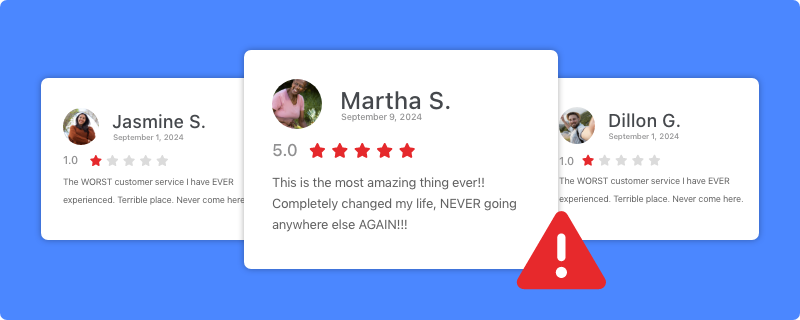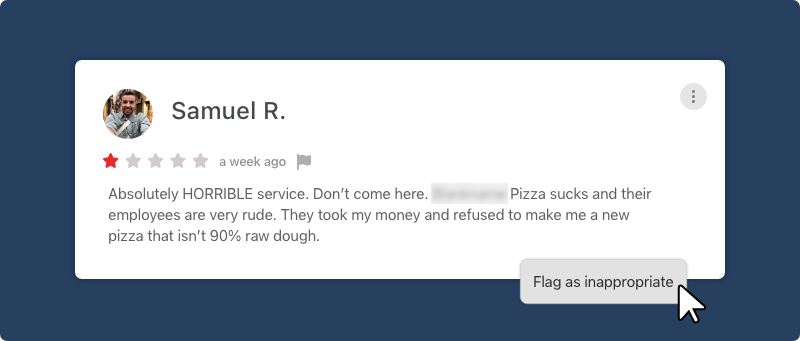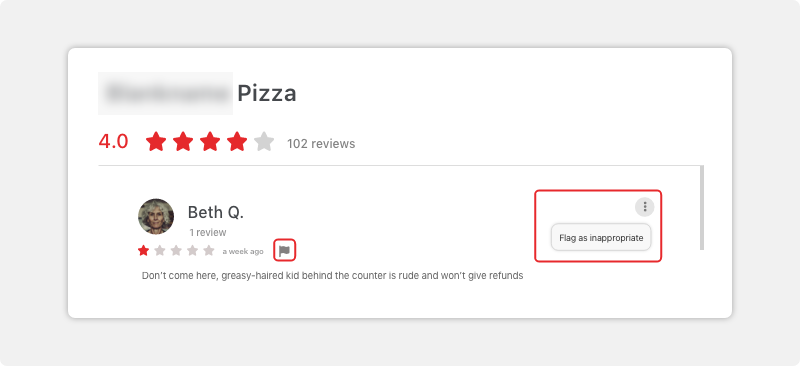Customer reviews are an important type of social proof, playing a significant role in customers' research process and influencing their shopping decisions. They're also an important ranking factor that Google weighs heavily in its decisions about where to rank local businesses in search results.
Just one negative review, whether it's legitimate or not, can tarnish a business's reputation, steering customers away and hurting its local search rankings.
It can take dozens of positive reviews to offset the negative impacts of a single negative one, which is why it's so important for businesses to monitor reviews and analyze sentiment to manage their online reputation.
But, while conducting sentiment analysis and implementing business changes can help businesses improve their reviews and rankings in the long run, there's something else to be on the lookout for that can set you back: fake Google Reviews.

What Are Fake Google Reviews?
Fake Google reviews are deceptive reviews posted on a business's Google Business Profile that do not reflect genuine customer experiences.
These reviews can be positive or negative and are often intended to manipulate a business's online reputation and search rankings. They can come from various sources and be left for different reasons.
Possible Sources of Fake Google Reviews
Competitors
Some businesses might post fake negative reviews on a rival's profile to damage their reputation, drive customers away, and gain an unfair competitive advantage. This is what's known as a Black Hat SEO tactic, and it's a seriously shady practice that no reputable business or local SEO professional should ever engage in.
Disgruntled Customers
Occasionally, dissatisfied customers may exaggerate or fabricate negative reviews out of frustration or in an attempt to hurt a business. They may even go so far as to create multiple new Google Accounts to leave more than one fake Google Review on the business's profile.
Paid Services
There are services and individuals who sell fake reviews, offering businesses a quick way to inflate their ratings with positive comments or, conversely, providing negative reviews for competitors.
Bots and Automated Tools
Some fake reviews are generated by automated software, often in large quantities, to create the appearance of a widespread sentiment, either positive or negative, about a business.
In fact, AI-generated reviews have been such an issue as of late that the US Federal Trade Commission (FTC) recently banned all fake reviews, including AI- and human-written, in an effort to cut down on fake product reviews and other false testimonials that "waste people's time and money" and hurt honest businesses.
Friends, Family, or Employees
In some cases, businesses ask friends, family, or employees to leave positive reviews on their Business Profiles to boost their ratings artificially, or to leave negative reviews on their competitors' profiles to gain an unfair competitive advantage.
It's also possible for a disgruntled former employee to create fake accounts in order to leave fake Google Reviews on their old employer's Business Profile, simply in an effort to hurt the business because of a personal grudge.
Potential Reasons People Leave Fake Google Reviews
Reputation Management and Local SEO
Businesses or individuals may leave fake positive reviews to enhance their reputation, counteract negative feedback, and boost their rankings in local search results.
While this may work in the short-term, it can seriously hurt a business in the long-run. If Google catches on to it, it can result in a Google Business Profile violation and suspension. And, with the recent FTC ban of fake reviews, it could even result in legal consequences, including a fine of up to $51,744 per transgression.
The potential short-term benefits of trying to use fake reviews to boost reputation and rankings are never worth the potential long-term consequences! There are plenty of legitimate reputation management and local SEO tactics that you can use to achieve sustainable growth.
Shady Competitive Tactics
Competitors might leave fake negative reviews to harm a rival's business, making their own services or products appear more favorable by comparison and hurting their competitor's local SEO.
Financial Incentives
Some people are paid to leave fake reviews, either through direct payment or in exchange for products, services, or discounts.
Revenge or Malice
Personal vendettas, grudges, or other negative emotions can lead people to leave fake reviews to cause harm.
Influence and Manipulation
Fake reviews can be used to sway public perception or influence decisions, especially when a business is new and trying to build credibility.

Scams
In some cases, scammers leave fake Google reviews to try and get something out of the business. For example, they might claim that they purchased a product that was defective to try and get a refund, when they never really purchased anything at all.
How To Spot Fake Google Reviews
While fake reviews can sometimes be hard to spot, there are some red flags that businesses and local SEOs should watch out for to help them identify and remove fake Google Reviews. These include:
- Extreme Language: Fake reviews often use overly dramatic or exaggerated language and punctuation. If a review seems too good to be true (e.g., "This is the best service ever!!!"), or excessively negative (e.g., "Worst experience of my life!!!!"), it could be fake.
- Lack of Specific Details: Genuine reviews usually include specific details about the customer's experience, such as the product or service they received. Fake reviews, on the other hand, tend to be vague and general (e.g., "Great place" or "Terrible service" without further explanation).
- Bulk Reviews in a Short Time Frame: If a business suddenly receives a large number of reviews within a short period, this could be a sign of a coordinated fake review campaign. Genuine reviews typically come in at a more steady and natural pace.
- Reviewer Activity: Check the reviewer's profile for suspicious activity. Some signs to watch for include:Â
- The reviewer has left multiple reviews for businesses in different geographic locations within a short time frame.
- The reviewer consistently leaves only five-star or one-star reviews, without any middle-ground ratings.
- The reviewer's profile shows very few reviews, or they've only reviewed one business.
- Repetitive Language: If multiple reviews contain similar or identical wording, it could indicate that the reviews were copied or generated by the same person or bot.
- Errors: If someone is getting paid or otherwise incentivized to leave fake Google Reviews, they're likely to make simple mistakes, such as copying and pasting the content from another review without changing the name of the business.

How To Remove a Fake Review From Google
If you discover a fake review on your Google Business Profile, taking action promptly is essential to protect your reputation. Here's a step-by-step guide on how to report fake Google Reviews to get them removed:
- Flag the Review:
- Go to your Google Business Profile and locate the fake review.
- Click on the three vertical dots next to the review and select "Flag as inappropriate."
- Google will review your report, but this process can take several days.

- Provide Evidence to Google My Business Support:
- If flagging the review doesn't result in its removal, you can escalate the issue by contacting Google Business Profile support directly.
- Gather evidence that supports your claim that the review is fake, such as proof that the reviewer was never a customer or discrepancies in the reviewer's story or timeline.
- Submit this evidence through the support form or during your communication with Google's support team.
- Encourage Authentic Customer Reviews:
- A strong strategy for counteracting the impact of fake Google reviews while waiting for them to get removed is to encourage your legitimate customers to leave honest reviews.
- Positive, genuine reviews can help dilute the effect of any fake reviews on your overall rating.
- Respond Publicly to the Review:
- While waiting for Google to take action, it's a good idea to respond to the fake Google review publicly.
- Be professional and polite in your response, saying something like, "We take all feedback seriously, but we cannot find any record of your visit. If you could contact us directly, we'd be happy to address your concerns."
- This shows other potential customers that you are proactive and committed to addressing issues, even if the review is not legitimate.
- Follow up with Google:
- If the review hasn't been removed after a reasonable amount of time, follow up with Google support. Persistence can sometimes help move things along.
- Take Legal Action (Last Resort):
- In extreme cases, where fake reviews are causing significant harm to your business, you may need to consult legal counsel. The recent FTC crackdown on fake reviews could provide a legal basis for action against those responsible.
Wrapping Up
Fake Google reviews can have a major detrimental impact on a business's reputation, local SEO performance, and customer trust. They can mislead potential customers, skew perceptions, hurt search rankings, and make it difficult for businesses to compete fairly in their local markets.
While fake reviews can come from various sources, including competitors and disgruntled customers or former employees, they are universally damaging and can create long-lasting challenges for businesses.
However, businesses are not powerless against fake reviews!
By learning how to spot suspicious activity, swiftly reporting fake reviews to Google, and encouraging genuine feedback from satisfied customers, you can protect your online reputation. The process of removing fake Google reviews can be time-consuming and stressful, but the effort is necessary to maintain a credible presence on Google.
And remember, maintaining the integrity of your Google Business Profile is not just about removing fake reviews. It's also about actively engaging with your audience and demonstrating transparency.
When handled correctly, this process can even strengthen your brand's image by showing potential customers that you value honest feedback and are committed to providing a positive customer experience.
Ultimately, taking a proactive approach to managing your reviews, including consistent monitoring and review analysis, will help ensure that your business remains well-regarded in the eyes of Google and the customers searching for your products or services alike!

